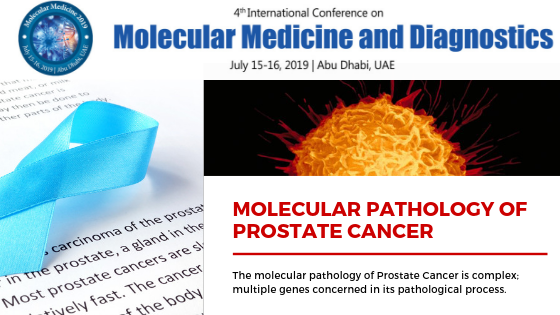Prostate Cancer (PCa) is the second most typically diagnosed malignancy in men and has a
particularly heterogeneous clinical behaviour. PCas are hormonally driven
diseases in which sex hormone plays a central role. Microarray technology has
recently accelerated the study of the molecular events concerned in Prostate Cancer,
giving the prospect of additional precise prognosis and new therapeutic ways. Prostate cancer represents one in 10 cases of
cancer in men. Prostate tumours, though slower growing than most tumours varies
widely in their aggressiveness. The molecular pathology of Prostate Cancer is
complex; multiple genes concerned in its pathologic process, however extra
environmental factors like diet and inflammation are concerned.
Though getting malignant neoplasm tissue is important for this genomic and molecular identification, knowing once to a diagnostic test, choosing the acceptable pathological process the lesion, and decoding the results are major challenges facing clinicians these days. Further, prostate tumours usually acquire molecular alterations with sickness progression and treatment resistance.
The exact cause of
prostate cancer is unclear, but there are many possible risk factors.
- Age
- Geography
- Genetic factors
- Diet
- Medication
- Obesity
Regular screening can
help detect prostate cancer while it is still treatable.
- Medical history and physical exam
- PSA blood test
- Transrectal ultrasound (TRUS)
- Prostate biopsy
- Gleason score or Grade Group
- The imaging tests for prostate cancer include:
- Bone scan
- Computed tomography (CT) scan
- Magnetic resonance imaging (MRI)
- Lymph node biopsy
The below things listed might
possibly lower your risk of prostate cancer.
- Body weight, physical activity, and diet
- Vitamin, mineral, and other supplements
- Some Medicines ( 5-alpha reductase inhibitors, Aspirin)
- Ask your doctor for a survivorship care plan
- A suggested schedule for follow-up exams and tests
- Diet and physical activity suggestions
- Typical follow-up schedules after prostate cancer
- The prostate will Cancer can recur even a few years once the treatment, that is why it’s vital to stay regular doctor visits and reports any new symptoms.
J U L Y 15-16, 2019 | D U
B A I, U A E

No comments:
Post a Comment